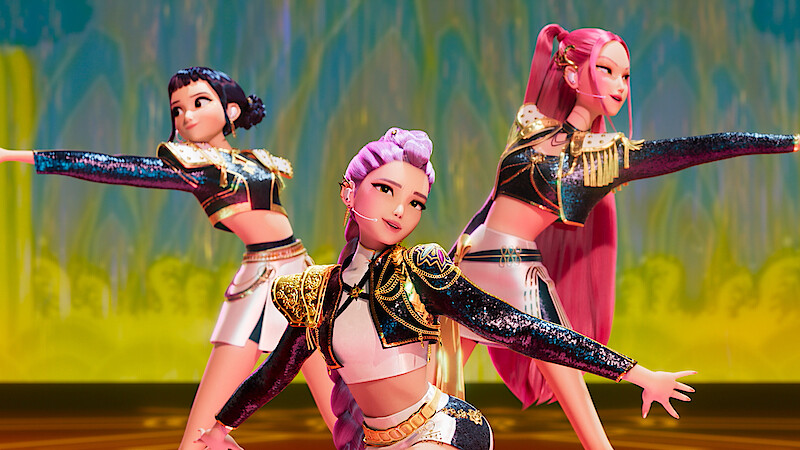Since its Netflix release in June 2025, KPop Demon Hunters – an animated children’s movie about a Korean girl band – has broken records, becoming the platform’s second-most popular film of all time. Its soundtrack has matched that momentum: the anthem “Golden” reached the top of the Billboard Hot 100, the first time a girl group claimed that spot since Destiny’s Child in 2001. Other tracks, such as “Soda Pop” and “Takedown,” have charted across the global top 10. Sing-along theater screenings are taking place across the US, Canada, Australia, New Zealand and the UK. How has such a seemingly niche film soared to such heights? There are more than just catchy tunes at play here.
K-pop – simply an abbreviation for Korean pop music – continues to cross borders. Acts are usually composed of multiple members rather than solo stars, and these idols (as members come to be known) are meticulously trained to combine vocals, rap and dance with dazzling visuals. As the title suggests, the musicians depicted in the film KPop Demon Hunters also hunt down demons.
These idols – Rumi, Mira and Zoey – perform as Huntr/x, a globally beloved band whose powerful music strengthens an invisible shield that separates the human world from a demon realm. The demons are eager to devour human souls, and when one occasionally escapes into our world, the members of Huntr/x battle them away. All this goes according to plan, until a group of five demons change strategy: led by Jinu, a former human trapped in the demon realm due to a Faustian bargain, five demons form a rival boy band to steal Huntr/x’s greatest source of strength, their fans’ hearts.
The competition between these two pop groups and the fan rivalries that ensue act as a cover for the real battle raging between the demons and their hunters for human souls. There are frequent song and dance interludes. If this sounds like a campy fever dream, it easily could have been. Instead, the movie lands with sincerity – not only in its pitch-perfect celebration of K-pop but in its message, which is surprisingly thoughtful.
Alongside the glittering fun of K-pop spectacle, the film also offers deep reflections on darker themes. The final showdown even fuses a boy-band anthem with the 13th-century liturgical hymn Dies Irae. The mashup of K-pop and Gregorian chant shouldn’t work, but it does.
It has a message that even C.S. Lewis would resonate with. Rumi, Huntr/x’s lead singer, forms a fragile friendship with Jinu, leader of the demon band. In life, Jinu traded his soul to the top devil, Gwi-Ma, for fame and luxury, abandoning his family to poverty. Ever since, Jinu’s greatest wish has been to silence Gwi-Ma’s voice in his head telling him he’s irredeemable. “That’s all demons do,” Jinu tells Rumi. “Feel. Feel our shame, our misery. It’s how Gwi-Ma controls us.” This description of shame echoes a primary theme of Lewis’s The Screwtape Letters. In that book, a demon named Screwtape writes to his apprentice Wormwood that the final victory of the devil is to nurture shame that induces despair and a total lack of belief in the possibility of redemption. Screwtape calls despair “a great triumph.”
Both Rumi and Jinu fear they are irredeemable. But as they grow closer, Jinu begins to hope. A poignant moment comes when he is handed a drawing by a young fan with the message, “Jinu, you have a beautiful soul.” Rumi, meanwhile, carries her own hidden shame, one that fuels her hatred of demons. But Jinu explains to her, “If hate could defeat Gwi-Ma, I would have done it a long time ago.” The song that eventually defeats the demons and seals the barrier is not the vicious “Takedown” but the hopeful and vibrant “What It Sounds Like.”
The music and animation in KPop Demon Hunters sparkle, as does its moral clarity, in contrast to so much modern storytelling which leans into moral relativism. Where Disney’s live-action remakes present villains like Maleficent or Cruella as misunderstood anti-heroes, this film shows that evil exists and that it whispers to us, wanting our souls. But redemption is always possible and waiting to be actively chosen. As Rumi tells Jinu: “Nobody else gets to decide if you feel [hope]. That choice belongs to you.” In admitting their failures with humility but striving to become better, the musicians of Huntr/x show themselves to be idols worthy of their fans’ adoration, in stark contrast to the demons who sing: “I’m the only one who’ll love your sins.”
And, of course, this moral (almost theological) victory happens in a stadium of screaming fans, with a great soundtrack and a bit of dancing thrown in. Fusing spectacle with depth, the film has earned its popularity and set the stage for already-confirmed sequels.
























Leave a Reply